

Cognitive style. Cognitive style or "thinking style" is a term used in cognitive psychology to describe the way individuals think, perceive and remember information.
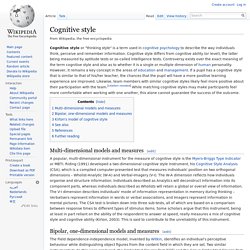
Cognitive style differs from cognitive ability (or level), the latter being measured by aptitude tests or so-called intelligence tests. Controversy exists over the exact meaning of the term cognitive style and also as to whether it is a single or multiple dimension of human personality. However, it remains a key concept in the areas of education and management. If a pupil has a cognitive style that is similar to that of his/her teacher, the chances that the pupil will have a more positive learning experience are improved.
Likewise, team members with similar cognitive styles likely feel more positive about their participation with the team. Multi-dimensional models and measures[edit] A popular, multi-dimensional instrument for the measure of cognitive style is the Myers-Briggs Type Indicator or MBTI. Overview of learning styles. Many people recognize that each person prefers different learning styles and techniques.
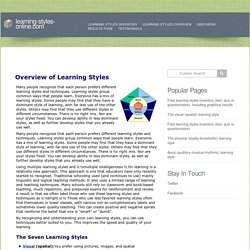
Learning styles group common ways that people learn. Studying and Holistic Learning. Like my article on speed reading, it seems that my article on holistic learning has brought a fair bit of confusion and controversy even for a large amount of coverage.
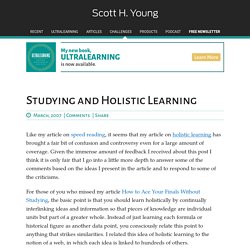
Given the immense amount of feedback I received about this post I think it is only fair that I go into a little more depth to answer some of the comments based on the ideas I present in the article and to respond to some of the criticisms. 9 Characteristics Of 21st Century Learning. The label of “21st Century learning” is vague, and is an idea that we here at TeachThought like to take a swing at as often as possible, including: –weighing the magic of technology with its incredible cost and complexity –underscoring the potential for well thought-out instructional design –considering the considerable potential of social media platforms against its apparent divergence from academic learning Some educators seek out the ideal of a 21st century learning environment constantly, while others prefer that we lose the phrase altogether, insisting that learning hasn’t changed, and good learning looks the same whether it’s the 12th or 21st century.
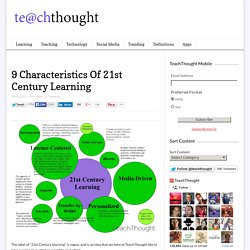
At TeachThought, we tend towards the tech-infused model, but do spend time exploring the limits and challenges of technology, the impact of rapid technology change, and carefully considering important questions before diving in head-first. The size of the circles on the map are intended to convey priority. 1. 2. 3. 4. 5. Neuro Learning. New Learning Skills. New Memory Aids. Bespoke Education. Ple. Neuro Learning. Other Learning. New Learning. NewEd. EDUCATION. How to Learn on Your Own: Creating an Independent Scholar Resource Plan. One of the most challenging and gratifying parts of learning alone is the opportunity to search for and select your own learning material.
Students in traditional classrooms usually don’t get to decide how they are going to master course content. Instructors decide for them in the form of textbook selection, quizzes, tests, group projects, etc. As an independent learner, you can make your study time more effective by using only the learning methods that work for you. A resource plan is a document used to brainstorm the learning material you can use when you begin your studies. Before you write a step-by-step schedule, think of every resource that is available to you (such as books, websites, knowledgeable people, etc). This article will show you how to create a resource plan to use in your independent studies.
Step 1: Set a Goal The first step to creating a resource plan is to decide on a single goal. The Key To Learning: Knowing How Learning Works. What’s the key to effective learning?
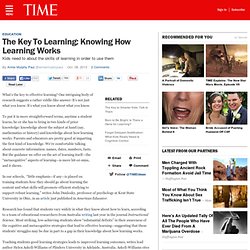
One intriguing body of research suggests a rather riddle-like answer: It’s not just what you know. It’s what you know about what you know. To put it in more straightforward terms, anytime a student learns, he or she has to bring in two kinds of prior knowledge: knowledge about the subject at hand (say, mathematics or history) and knowledge about how learning works. Parents and educators are pretty good at imparting the first kind of knowledge. We’re comfortable talking about concrete information: names, dates, numbers, facts. In our schools, “little emphasis—if any—is placed on training students how they should go about learning the content and what skills will promote efficient studying to support robust learning,” writes John Dunlosky, professor of psychology at Kent State University in Ohio, in an article just published in American Educator.
Index of Learning Styles Questionnaire. How to Learn Without Memorizing. Photo by Edwin Stemp Rote memorization is an inefficient way to learn.

Just retaining a single formula can mean pounding the same information into your skull dozens of times. If your computer hard drive had this accuracy, you’d probably throw it out. Unfortunately, you’re stuck with your brain. The good news is that you don’t need to learn by memorization. A few years ago, I noticed that smart people seemed to learn differently than most other people. Overview of learning styles. What's Your Learning Style?
The New Learning Architect. These are my live blogged notes from Clive Shepard’s presentation titled The New Learning Architect, part of the eLearning Guild’s Thought Leaders Webinar Series.

Clive’s book of the same title is available for purchase if you have a Kindle (which I don’t, so I haven’t read the book). (Update 10/16/11: Clive pointed out in the comments below that the book is also available in paperback.) Additional information and excerpts from the book are available on the Onlignment site. Any typos, mistakes, incomplete thoughts, etc. are mine, not the presenter’s. My side comments in italics. Clive saw too much “us vs. them” with people supporting traditional vs. new learning methods. We are born as learning machines. Who/what contributes to learning? Teachers, coaches, facilitators, etc. can facilitate this conscious learning.Peers–we have tended to not acknowledge this muchInfo/ContentExperts The point is that how we learn ourselves depends on the situation.
Four Contexts. Learning Styles Quiz Image Search Results. Index of Learning Styles Questionnaire. Felder & Soloman: Learning Styles and Strategies. Richard M.
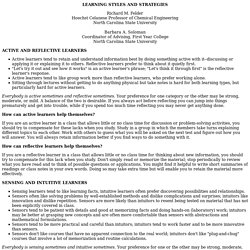
Felder Hoechst Celanese Professor of Chemical Engineering North Carolina State University Barbara A. The 7 Styles Of Learning: Which Works For You?